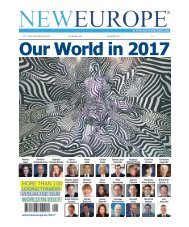Our World in 2018
Leading minds reflect on the state of our societies, and examine the challenges that lie ahead. An edition dedicated to generating ideas that will help form a new vision for our world.
Leading minds reflect on the state of our societies, and examine the challenges that lie ahead. An edition dedicated to generating ideas that will help form a new vision for our world.
Create successful ePaper yourself
Turn your PDF publications into a flip-book with our unique Google optimized e-Paper software.
limited to my country, much less to
Tokyo. Though Tokyo is my primary
responsibility, and the focus of all
my thoughts and plans, I am also
concerned with the fate of the capital
of next-door South Korea, Tokyo’s
great sister city.
I know the Korean people well,
and I have no doubt that they, too,
are preparing with their characteristic
rigor and stoicism. Yet Seoul remains
particularly vulnerable to the whims of
North Korea’s impetuous and ruthless
leader, Kim Jong-un – and that should
concern all of Asia’s municipal leaders.
No city is an island, safe unto
itself. That is why the leaders
of Asia’s megacities should
to neutralize the threat to the entire
region, not just our own homes.
National governments will listen to us.
After all, cities account for most of an
economy’s dynamism; without their
catalytic force, Asia’s rapid economic
growth over the last four decades
would not have been possible. And
cities are the beating cultural heart of
modern Asian societies.
It is time for Asia’s urban leaders
to use this influence, by banding
together to help mitigate the threat
posed by the rogue Kim regime. For
that, unlike in the past, the United
Nations sanctions imposed on North
Korea are enforced to the letter.
At the same time, Asia’s municipal
leaders must use their own policing
powers to prevent illicit wealth
transfers from their jurisdictions to
North Korea. This means pressuring
financial institutions and, perhaps
more important, unofficial money
transfer networks, to halt any
movement of funds to the North.
The leaders of Asia’s major
cities must also use every contact
with Chinese officials to urge them
to agitate for stronger efforts by
President Xi Jinping’s administration
to rein in the Kim regime. Xi has so
far been reluctant to tighten the
screws on North Korea, owing largely
to concerns about the potential
consequences for China if the Kim
regime collapses.
But the reality is that China’s great
urban centers now face the same
threat from the Kim regime as their
counterparts elsewhere in Asia. In fact,
now that China has voiced support for
UN sanctions – a step that probably left
Kim feeling betrayed – China’s cities
may be among the most vulnerable.
Words are not enough; even the
most heated rhetoric directed at the
North has proved entirely useless,
because it is not backed by action. For
C
embrace of the goal of North Korean
de-nuclearization. To that end, the
key policy initiative that Japan, South
Korea, and the United States must
embrace is to negotiate, and conclude,
an agreement with China about the
security situation that will prevail on
the Korean Peninsula should the Kim
regime collapse.
The contours of such an
agreement are not hard to
discern. The US, Japan, and
South Korea all hope for the eventual
K.
China, fearing that outcome, needs
assurances that America’s military
presence in South Korea, which has
been shrinking for over two decades
and no longer includes nuclear
weapons, will not be extended
northward, toward China’s own
border. South Korea’s government
blessing of its Japanese and American
allies, agreeing today in a formal treaty
lodged at the UN that no foreign
power’s troops will be permitted to
be stationed anywhere north of what
is now the demilitarized zone that
divides the two Koreas. Once the
GLOBAL VS. LOCAL WORLDS
Words are
not enough;
even the most
heated rhetoric
directed at
the North
has proved
entirely useless,
because it is
not backed by
action.
missile threat from the North was truly
eliminated, South Korea could also
remove the US-supplied Terminal High
Altitude Area Defense (THAAD) missile
system from its territory. As China has
(wrongly) viewed the THAAD system
as a threat to the viability of its own
nuclear deterrent, such a move would
eliminate what has become an open
wound between the two countries.
To provide China with further
assurances, and at no added risk to
South Korea, Japan, or the US, the
UN could also place peacekeeping
forces and inspectors on the ground.
A small number of Chinese soldiers
and inspectors could even be included
in these groups, so long as they take
orders from UN appointed leaders.
This is the agenda for peace
and security that Asia’s cities, which
have been leading the region into
the future for decades now, should
pursue in 2018. We must all now use
future free from the threat of nuclear
war.
OUR WORLD | 2018
Copyright: Project Syndicate, 2018. www.project-syndicate.org
141










